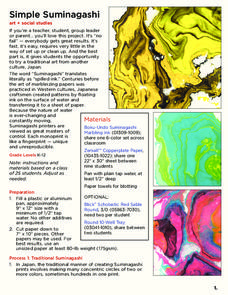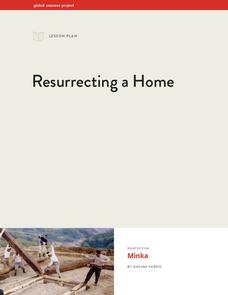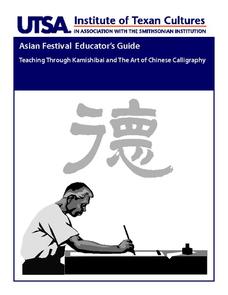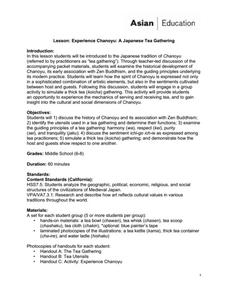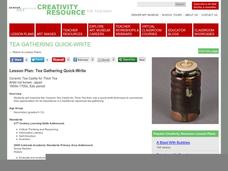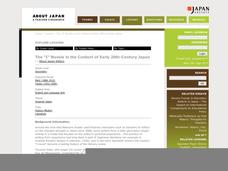Cleveland Museum of Art
Japanese Folktales (Asian Odyssey)
The Cleveland Museum of Art presents this interdisciplinary model unit that asks class members to explore how the same themes are presented in the folktales and art of several cultures.
Curated OER
Lesson: A Picture is Worth a Thousand Words: Attention to Detail
After a quick warm up activity, learners get ready to use their keen observation skills to examine an ornate Japanese pencil box. They discuss the artistry, skills, and story of the box, paying close attention to details. They then...
Curated OER
Lesson Plan: The Tour Starts at Noon
The Eleven-Headed Bodhisattva is a piece that represents characteristics, meanings, and ideals common to those who practice Buddhism in Japan. Learners fully analyze this piece, then take a virtual trip to examine the Buddhist...
Curated OER
Creating Scrolls Based on the Illustrated Tale of Genji
Now these are learning activities full of fun, art, and cultural exploration. Kids consider the art of storytelling through comic book images. They then look at the Tale of Genji as it was written in the 11th century. They discuss...
Curated OER
Say Hi to Haibun Fun
What is a haibun? With this interesting lesson, writers will experience the Japanese writing form haibun, identify elements important to Japanese writing styles, analyze a haibun, and compose their own. Different from the typical journal...
Curated OER
Japanese Tea and Teacups
Upper graders use the potter's wheel to make Japanese style tea cups, which they will use in a Japanese style tea ceremony. They hone their sculpting techniques while exploring Japanese cultural and the history of tea. There are two...
National Endowment for the Humanities
Hamlet Meets Chushingura: Traditions of the Revenge Tragedy
Learners read texts, view film and video and conduct research in an analysis and comparison of Shakespeare's "Hamlet" and the Kabuki piece "Chushingura". They focus their analysis on the theme of revenge.
Curated OER
Simple Suminagashi
What a wonderful way to meld art and culture! Learners create art work in the Suminagashi style using this detailed lesson plan. This art form, which is Japanese in origin, employs ink to create beautiful results. This will be a hit with...
Penguin Books
Teacher's Guide: When the Emperor Was Divine by Julie Otsuka
Julie Otsuka's haunting novel, When the Emperor Was Devine, is the subject of a 14-page teacher's guide. The guide includes the text of an interview with Otsuka, background information about Japanese immigration to the United States, and...
Center for History Education
Japanese American Internment During World War II
World War II turned nations against each other and neighbors into enemies. An eye-opening activity explores the dark past of Japanese-American internment camps during WWII. Scholars learn of the fear and distrust toward Asian Americans...
Global Oneness Project
Resurrecting a Home
Davina Pardo's documentary Minka asks viewers to consider that value of preserving traditional dwellings and traditional building techniques by examining how American journalist John Roderick and Japanese architect Yoshihiro Takishita...
UTSA Institute of Texas Cultures
Teaching Through Kamishibai and The Art of Chinese Calligraphy
Young learners discover kamishibai, a popular Japanese storytelling art, and explore how these Japanese folktales illustrate the country's cultural themes and values through discussion and storyboarding.
Asian Art Museum
Experience Chanoyu: A Japanese Tea Gathering
As part of the study of Japanese cultural history, introduce your class members to Chanoyu, the Way of Tea. After a discussion of the history and key elements of Chanoyu, class groups perform the ceremony.
Denver Art Museum
Tea Gathering Quick-Write
Japanese tea gatherings are the inspiration for a great lesson plan. Learners are provided with an image of a tea caddy made for thick tea and asked to describe what they notice and what that might mean. This leads into a larger lesson...
Japan Society
The “I” Novels in the Context of Early 20th-Century Japan
Although this lesson plan covers the rather obscure topic of the Japanese "I-novel", it also includes a great deal of historical information and material for an in-depth discussion of universal literary concepts. Specifically, young...
PBS
Exploring Selected Haiku by Issa
If your class doesn't know what a haiku is, show them two examples from the Japanese poet Issa (both included here), and have them make some observations. How long are they? What is the structure? A video and a list of questions help...
Incredible Art Department
Notan Collages - "Expanding the Square"
Notan is a Japanese word that expresses the interaction between light and dark. Learners explore Notan while creating dimensional art pieces that examine positive and negative spaces. They'll discuss the art of Notan, create...
Curated OER
Lesson: Creating With A Purpose
Discovering the creative process can be done through critical analysis. Upper graders examine a hand -carved Shinto Deity, discussing purpose, technique, and artistic expression. They then read a poem about the creative process. and...
Curated OER
Japanese Festivals and Holidays
Bring the excitement and beauty of Japanese festivals into your classroom. Kids with special needs create calendars that reflect special festivals and holidays common to Japanese culture. They start the project by creating a list of...
Curated OER
Say Hi to Haibun Fun
Students examine the Japanese writing form of Haibun. They identify the elements of Japanese prose and poetry, analyze a haibun for writing devices, complete a graphic organizer, and compose an original haibun as a form of journal keeping.
Curated OER
Paper Cranes
Paper folding is a great art form that can be incorporated into cultural, mathematic, and art lessons. This resource includes the full instructions needed to fold a paper crane, as well as a Haiku poetry idea. Tip: This activity would be...
Curated OER
Asian Art
Art from early China, Korea, and Japan is historically significant. Present these stunning images to your class, while you explain art movements that define traditional Chinese, Korean, and Japanese time periods and culture. Note: This...
Curated OER
Famous Person: Yushiko Uchida
Third, fourth, and fifth graders read the book The Bracelet by Yushiko Uchida and examine the events of Uchida's life. They participate in a guided discussion of Japanese culture, perform a reader's...
Curated OER
Japanese Poetry: Tanka? You're Welcome!
Students explore tanka, a form of Japanese poetry. They read and analyze tankas to determine the structure and intent, and compose a traditional and a non-traditional tanka.









